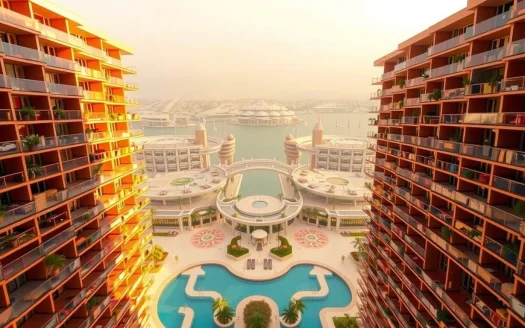How to Understand ROI Meaning in Real Estate: Maximize Your Dubai Investments
Dubai’s prime residential properties delivered an average ROI of 10.5% in 2023. These returns are nearly double the global average for similar investments.
Many investors find it challenging to understand and calculate their potential returns in Dubai’s ever-changing real estate market. Our team has witnessed numerous cases where overlooked factors and miscalculated ROIs resulted in disappointing investment outcomes.
Our experience as Dubai real estate professionals shows that understanding ROI (Return on Investment) is a vital part of making informed property investment decisions. The right ROI calculations and interpretations can mean the difference between a profitable investment and one that gets pricey – whether you’re thinking about your first Dubai property purchase or expanding your portfolio.
This piece breaks down everything you need to know about ROI meaning in real estate, with a special focus on Dubai’s unique market. We’ll help you become skilled at property investment returns, from simple calculations to advanced analysis techniques.
Understanding Real Estate ROI Fundamentals
Aliyas Real Estate believes that becoming skilled at ROI basics is vital to succeed in Dubai’s property investment market. Let me share everything you need to know about making smart investment decisions.
Definition and Basic Concepts
Return on Investment (ROI) measures how well a real estate investment performs by comparing profit to cost. ROI gives you a simple way to assess property investments with a straightforward formula: your annual return divided by your original investment .
Our work with Dubai investors shows that ROI percentages make comparing different investment opportunities easier. You can calculate an 8% cash-on-cash return when you earn AED 800 on a AED 10,000 investment .
Different Types of ROI in Real Estate
Our team uses several ROI calculations to give clients a complete investment analysis:
- Cash-on-Cash Return: Measures annual cash flow against total cash invested
- Capitalization Rate: Shows property’s performance whatever the financing
- Net Operating Income (NOI): Calculates rental income minus operating expenses
- Total ROI: Combines both cash flow and property appreciation
Dubai’s market typically yields a cash-on-cash return of 8-12% for rental properties. Property comparisons become much easier with capitalization rate calculations because they focus on the property’s performance alone .
Why ROI Matters for Property Investors
ROI plays a vital role in property investment. Numbers tell the story – rental properties have yielded an average return of 7.05% over 145 years across 16 industrialized countries .
ROI calculations help investors:
- Assess potential returns before purchase
- Track investment performance over time
- Make informed decisions about property improvements
- Compare different investment opportunities objectively
Dubai’s ever-changing market makes understanding ROI significant because property values and rental yields vary by a lot based on location and property type . Market conditions, property type, and location affect returns substantially, which makes ROI analysis a key tool for strategic investment decisions 1.
Calculating Real Estate ROI in Dubai
At Aliyas Real Estate, we know that calculating ROI in Dubai’s real estate market can substantially affect your investment success. Here’s a clear breakdown of calculations that will guide your investment decisions.
Basic ROI Formula and Components
The ROI formula we use for Dubai real estate is simple: ROI = (Net Profit / Investment Cost) x 100. These are the key components to think over:
- Purchase price and transaction costs
- Repair and renovation expenses
- Down payment on mortgage (if applicable)
- Operating expenses and maintenance costs
To cite an instance, if you buy a property for AED 1,000,000 and sell it for AED 1,200,000 with a net profit of AED 150,000, your ROI would be 15% .
Rental Yield Calculations
Rental yields are vital metrics for Dubai real estate investment. Dubai’s apartments show average rental yields of 5% to 8%, while villas yield 4% to 6% .
The rental yield calculation follows these steps:
- Determine annual rental income
- Calculate total property cost (including fees)
- Divide annual rental income by total cost
- Multiply by 100 for percentage
A property generating AED 100,000 annual rental income on a value of AED 1,500,000 would have a gross rental yield of 6.67% . The net rental yield gives you a full picture by including expenses and vacancy rates.
Capital Appreciation Assessment
Dubai’s market shows strong capital appreciation potential. Off-plan properties can see capital appreciation of 5-10% annually . Property values can rise by 15-30% from construction start to handover, and some areas have seen growth of 50-100% under favorable conditions.
Our Port De La Mer property showed exceptional results – its value jumped from 83 million AED to a minimum of 140 million AED . This shows the potential returns Dubai’s real estate market offers.
These factors shape capital appreciation:
- Historical price trends in the area
- Infrastructure developments
- Market demand patterns
- Economic indicators
Note that Dubai offers tax advantages with no annual property tax or capital gains tax. Investors just pay a one-time 4% property registration fee . Factor this into your ROI calculations.
Key Factors Affecting Dubai Property ROI
Our team at Aliyas Real Estate has worked with countless investors to pinpoint what drives ROI in Dubai’s real estate market. Let me share these game-changing elements that determine your investment success.
Location Impact on Returns
Location stands out as the biggest factor that shapes ROI. The market data from Q1 2024 reveals an interesting trend – residential areas away from downtown deliver the highest returns . Here’s a breakdown by area:
- Dubai Silicon Oasis tops the list with 9.3% ROI for apartments
- JVC (Jumeirah Village Circle) delivers 8.6% ROI
- Dubai Production City shows 8.3% ROI for apartment investments
- Palm Jumeirah’s luxury segment yields 4.8% in rentals
Property Type Considerations
Property size plays a huge role in your potential returns. The numbers show smaller units bring better percentage returns than larger ones. Here’s what we see:
| Property Type | Average ROI |
|---|---|
| Studio Units | 7.9% |
| 3-Bedroom Units | 6.7% |
Residential developments yield between 5% and 9% in rentals. Commercial properties perform even better with ROIs from 12% to 15% .
Market Timing Factors
The Dubai real estate market follows distinct patterns that affect ROI. Your best chances come during:
- Summer months (June to August): Transactions drop due to extreme heat, creating room for better deals
- Early sales phases: Off-plan properties often start at lower prices and appreciate substantially
Emerging neighborhoods like Dubai South offer unique opportunities despite varying levels of infrastructure and market demand . Properties near major business hubs such as DIFC, Business Bay, and Dubai Media City attract professionals looking for convenient living options consistently .
Pro Tip: Smart investors look at properties near future development projects. These areas tend to appreciate in value quickly. The areas surrounding the Expo 2020 site showcase this growth pattern perfectly.
Dubai-Specific ROI Considerations
Our team at Aliyas Real Estate has seen how Dubai’s unique investment landscape shapes returns on investment. Dubai stands out as an attractive destination for real estate investors due to its special features.
Tax Benefits and Implications
Dubai’s tax structure boosts real estate ROI potential. This tax haven gives investors remarkable advantages:
- No personal income tax on rental income
- Zero capital gains tax on property sales
- No annual property tax
- 5% VAT applicable only to specific transactions
These tax benefits directly change ROI calculations. Dubai’s rental yields rank among the highest worldwide. Foreign nationals own about 43% of the total residential property value.
Legal Framework Effect
Dubai Land Department (DLD) and Real Estate Regulatory Agency (RERA) create a strong structure that protects investor interests. This framework gives investors several advantages:
| Legal Aspect | Benefit to Investors |
|---|---|
| Property Registration | 4% one-time fee |
| Escrow Protection | Mandatory for off-plan sales |
| Dispute Resolution | Dedicated rental disputes center |
RERA’s strict regulations on developers and real estate agents have boosted market transparency. This leads to more predictable ROI outcomes .
Foreign Investment Regulations
Dubai’s rules for foreign investment have changed a lot. The city now attracts more international investors than ever. Recent data shows foreign-owned residential real estate grew by 20% (about USD 23 billion) between early 2020 and 2022 .
Our clients benefit from these vital features:
- Full ownership rights in designated freehold areas
- 100% repatriation of capital and profits
- Renewable residency visas for properties worth AED 1 million or more
- Access to special economic zones with additional benefits
Years of experience show that understanding Dubai’s specific considerations helps maximize ROI. Economic Substance Regulations (ESR) introduced in 2019 brought new reporting requirements. We help our clients stay compliant while getting the best returns possible.
Understanding Risk-Adjusted Returns
Our years of analyzing Dubai’s real estate market at Aliyas Real Estate have taught us smart ways to understand risk-adjusted returns. Let’s take a closer look at how we help investors get the most from their investments while keeping risks in check.
Risk Assessment Methods
Our team uses several advanced methods to assess investment risks in Dubai’s real estate market. The data analytics team runs thousands of scenarios using Monte Carlo simulation to estimate possible investment outcomes. This gives us a way to measure uncertainties tied to property investments.
| Assessment Method | Primary Use | Key Benefit |
|---|---|---|
| Value at Risk (VaR) | Portfolio loss estimation | Sets risk tolerance levels |
| Sensitivity Analysis | Variable impact study | Identifies critical risk factors |
| GIS Technology | Location-based assessment | Better decision-making |
Risk Mitigation Strategies
Experience shows that good risk management needs an all-encompassing approach. These strategies have proven to work well:
- Market research and property inspections as part of due diligence
- Strong property management with careful tenant screening
- Right insurance coverage for property and liability protection
- Regular market trend updates and flexible approach to changes
Blockchain for property deals and AI for predictive analytics have changed how we assess risks completely .
Balancing Risk and Return
We focus on finding the sweet spot between potential gains and market risks. Recent data shows Dubai’s real estate market offers great opportunities but comes with its share of risks.
Investors should know that:
- Global economic conditions and oil prices affect Dubai’s property market volatility
- ROI takes a hit from maintenance fees, service charges, and registration costs
- Developer’s track record matters a lot for off-plan investments
Dubai offers unique advantages that help optimize returns:
- Strong economy with diverse industries
- No personal income and capital gains tax
- Zero annual property tax on residential and commercial properties
Our risk measurement process brings together property owners, lenders, managers, and investors to assess physical, liability, financial, cyber, and regulatory risks . This shared approach will give a complete picture of risks and how to manage them.
ROI Comparison Across Property Types
Aliyas Real Estate has analyzed thousands of property transactions in Dubai’s real estate market of all types. This analysis compares different property types to help you make smart investment decisions.
Residential vs Commercial Returns
The market shows clear differences between residential and commercial property returns. Commercial properties yield higher rental returns that exceed 8% . Residential properties provide more stable returns with lower risks.
Our market observations reveal:
- Commercial properties generate rental yields up to 11.1%
- Residential properties average between 5-7% rental yields
- Commercial leases run 3-10 years and provide stable long-term income
- Residential leases last 1-2 years with more frequent rent adjustments
Off-Plan vs Ready Property ROI
Dubai’s ever-changing market shows notable differences between off-plan and ready property investments. Recent data reveals:
| Property Type | Performance Metrics |
|---|---|
| Ready Apartments | 36.1% year-over-year ROI |
| Ready Villas | 38.5% year-over-year ROI |
| Off-Plan Properties | 12% price appreciation annually |
Ready and off-plan apartments show a price gap of 33.6% favoring off-plan properties . This gap grew to 45.4% after COVID, creating new investment possibilities.
Luxury vs Mid-Market Investments
Dubai’s property market demonstrates distinct ROI patterns across market segments:
Affordable Segments: Discovery Gardens and Dubai Investment Park’s rental yields reach 11% . These areas attract investors looking for substantial returns.
Mid-Tier Properties: Dubai Sports City and Dubai Silicon Oasis yield returns above 9% . Young professionals and families prefer these locations.
Luxury Segment: The Sustainable City’s ROI exceeds 7%. This area combines premium returns with environmental features.
Smaller units generate higher percentage returns based on our research:
- 1-BHK units show an 8.5% ROI
- International City’s studios deliver 8.3% ROI
- Dubai Industrial Park’s 3-bedroom villas offer 7.1% ROI
Dubai’s property market performs better than many global cities with above-average rental yields. London and New York’s rental yields stay around 4-5%, while Dubai offers much higher returns . The city’s prime residential market grew by 17.4% in 2023, this is a big deal as it means that the global average of 2.2%.
Common ROI Calculation Mistakes
Our team at Aliyas Real Estate talks to property investors daily. We’ve noticed that even seasoned investors sometimes slip up when they calculate their ROI. Let me walk you through these common mistakes and show you how to steer clear of them.
Hidden Costs Often Overlooked
Most investors only look at the purchase price and expected rental income. They miss other vital expenses. The service charges for UAE properties can cost anywhere from AED 5 to AED 30 per square foot each year. This affects returns by a lot.
Here are some expenses that slip through the cracks:
| Expense Type | Typical Range |
|---|---|
| Maintenance | 10-15% of annual rent |
| DEWA Deposit | AED 2,000 (refundable) |
| Monthly Utilities | AED 1,200-2,500 |
| Property Management | 2% of property value |
We tell our clients to factor in one-time fees before their first investment. These include mortgage payments, taxes, insurance, and property management charges .
Depreciation Considerations
Getting depreciation right matters a lot for ROI calculations. Here’s what we know from experience:
- Property depreciation starts when it’s ready for rental use
- Residential rental properties lose 3.636% value each year over 27.5 years
- You can only depreciate building value, not land value
Many investors don’t realize that depreciation can cut their tax bill. Let’s say you buy a property for AED 400,000 with land value of AED 100,000. Your yearly depreciation deduction would be about AED 10,909 .
Market Assumption Errors
Investors often make mistakes by being too optimistic about the market. Our data shows these common errors:
- Occupancy Expectations: They assume properties will always have tenants
- Market Demand: They look only at past data to predict future returns
- Competition Analysis: They don’t check how many similar properties are in the market
Smart investors plan for 1-2 months without tenants each year. They also study the market well before making any assumptions about rent or property value increases.
Our Dubai market analysis shows that population changes and too many similar properties can hurt returns . We had a case where an investor’s expected 8% return fell to 5%. This happened because of surprise maintenance costs and longer empty periods than expected .
Here’s what we tell our clients to avoid these mistakes:
- Keep extra money for surprise expenses
- Study local market conditions
- Make realistic predictions based on current trends
- Know all the fees and charges
Our years in Dubai’s real estate market have taught us something important. Good ROI calculations need you to understand both clear and hidden costs. You also need proper depreciation accounting and realistic market assumptions backed by solid research.
Tools and Resources for ROI Analysis
Smart investment decisions need sophisticated tools and reliable resources. Aliyas Real Estate uses state-of-the-art technology and professional services to help clients get maximum returns. Here are the tools that can boost your ROI analysis in Dubai’s real estate market.
Digital ROI Calculators
Digital calculators make ROI calculations faster by a lot. SmartCrowd’s calculator excels with its detailed approach. Investors can analyze potential returns with these variables:
| Calculator Feature | Analysis Capability |
|---|---|
| Annual Rental Return | 4% to 12% range analysis |
| Capital Appreciation | 2% to 8% projection range |
| Total Returns | 5-year forecast calculation |
DXB Interact’s ROI calculator adds more sophistication by including:
- Property reference and size details
- Maintenance contract costs
- Service charge calculations
- Net ROI amount and percentage calculations
Market Research Platforms
Our team depends on AI-powered platforms to analyze markets effectively. Realiste has changed our market research approach by offering:
Advanced Analytics Features:
- Property price forecasting using AI algorithms
- Neighborhood statistics analysis
- Historical data tracking
- Economic indicator integration
DXB Interact has become our preferred platform for detailed market insights with:
- Immediate sales transaction data
- Price trend analysis
- Rental activity monitoring
- Project-specific watchlists
The platform’s “Trends by Area” feature helps analyze specific projects or areas and identifies new investment opportunities. This level of detail is vital for smart investment decisions.
Professional Valuation Services
We work with RICS-certified firms that provide detailed assessment services. These valuations matter for:
- Loan Security Purposes:
- Acquisition finance
- Refinancing
- Loan monitoring
- Investment Decisions:
- Portfolio valuations
- Stock exchange valuations
- Financial accounting
Our valuation partners are experts in properties of all types:
- Residential developments
- Commercial offices
- Industrial facilities
- Retail properties
- Mixed-use schemes
Professional valuations prove their worth especially with complex investments. AA Valuation’s RICS-certified reports have helped our clients get better financing terms . Their Dubai Land Department and RERA certifications ensure local compliance .
These tools and resources have transformed our ROI analysis approach. A luxury apartment evaluation in Downtown Dubai combines:
- Digital calculator projections for first assessment
- AI-powered market analysis for price trends
- Professional valuation to verify
This comprehensive method works well in Dubai’s dynamic market where property values change rapidly. Combined resources paint a more accurate picture of potential returns than single tools.
Experience shows successful investors use these resources together. They:
- Begin with simple ROI calculations using digital tools
- Verify assumptions through market research platforms
- Confirm valuations through professional services
- Track performance with ongoing market analysis
Each tool serves a unique purpose in investment analysis. Digital calculators provide quick assessments while professional valuation services deliver depth for major investment decisions . Market research platforms help track trends and opportunities continuously .
Conclusion
ROI understanding plays a key role in successful real estate investment in Dubai’s ever-changing market. Investors who become skilled at ROI calculations and think over Dubai-specific factors make smarter investment choices. Our experience proves this point.
Dubai’s property market is a chance to benefit from tax advantages, robust legal systems, and a wide range of property choices. Numbers back this up – prime residential properties here generate returns that are almost twice the global average.
Smart property buyers need to track all costs, get a full picture of the market, and work with professional valuation experts. These steps, plus proper risk assessment and regular monitoring, boost returns and reduce potential risks.
Real estate success in Dubai stems from careful analysis, good planning, and current market knowledge. The insights from this piece will help you make confident investment choices that match your money goals.
FAQs
How do you calculate ROI for real estate investments in Dubai?
To determine the return on investment (ROI) for real estate in Dubai, you can use this formula: Divide the annual income generated by the property by the total initial investment (including purchase and other related costs), and then multiply the result by 100 to express it as a percentage. For example, if a studio apartment generates AED 41,000 annually and the total initial investment was AED 657,000, the calculation would be (AED 41,000 ÷ AED 657,000) x 100 = 6.2% ROI per annum.
What is considered a good ROI in real estate?
What qualifies as a “good” ROI in real estate can vary significantly depending on an investor’s appetite for risk. However, generally, real estate investors seek ROIs that exceed 10% as a benchmark for satisfactory returns.
How should ROI be interpreted in real estate investments?
Interpreting ROI in real estate involves assessing whether the return is positive or negative. A positive ROI indicates that the investment has generated a profit over the period it was held, whereas a negative ROI suggests a loss.
What does ROI signify in the context of real estate?
In the realm of real estate, ROI measures the profitability of an investment by calculating the net income it generates. The formula to compute real estate ROI is: ROI = (Net Operating Income + Sale Price – Purchase Price) / Purchase Price. This calculation helps investors understand the efficiency of their investment relative to its cost.





